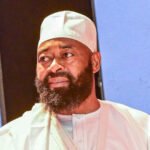The recent ban on Eedris Abdulkareem’s song, ‘Tell Your Papa’, by the National Broadcasting Commission (NBC) has once again reignited concerns about freedom of expression and censorship in Nigeria.
Development Diaries reports that Abdulkareem, known for his socially conscious music, released the track in response to a public statement made by President Bola Tinubu’s son, Seyi Tinubu, in which he described his father as Nigeria’s best-ever president.
In its response, NBC directed Nigerian radio and television stations not to air the protest song.
Meanwhile, Abdulkareem has clarified that the song was a response, rather than a personal attack, highlighting the economic hardship, insecurity, and lack of basic amenities faced by Nigerians.
The NBC’s swift action to ban the song appears heavy-handed and is reflective of a growing intolerance towards dissenting voices.
Artistes like Abdulkareem follow in the tradition of Fela Kuti, who used music as a tool for activism. Banning their works neither erases the problems they highlight nor silences the frustrations of millions of Nigerians.
The NBC’s action also raises critical questions about the objectivity of the regulatory body and the extent to which its decisions are influenced by political power.
According to it, the song is classified as Not To Be Broadcast (NTBB), as it violates Section 3.1.8 of the Nigeria Broadcasting Code.
While broadcast guidelines are important to maintain standards, they must not become instruments for suppressing expression.
Abdulkareem’s song speaks directly to the socioeconomic realities experienced by Nigerians daily. It is worth noting that the song did not incite violence or spread misinformation; it merely amplified the voices of struggling citizens.
This development further reinforces the need for the NBC to review its broadcast code in line with the provisions of Nigeria’s 1999 constitution, especially section 39, which guarantees freedom of expression and the right to receive and impart ideas without interference.
Regulations that appear to stifle criticism of public officials contradict the spirit of democracy and transparency.
The NBC Board has the sole authority to review and approve any amendments to the NBC Code as stipulated in the NBC Act and the First Schedule of the Act.
In light of this, Development Diaries calls on the Bolarinwa Bashir-led NBC Board to consider the review of the regulatory body’s codes to ensure they reflect the democratic values enshrined in the constitution.
Such a review must include provisions that protect artistic expression and prevent the arbitrary banning of content that critiques leadership.
Photo source: Eedris Abdulkareem






